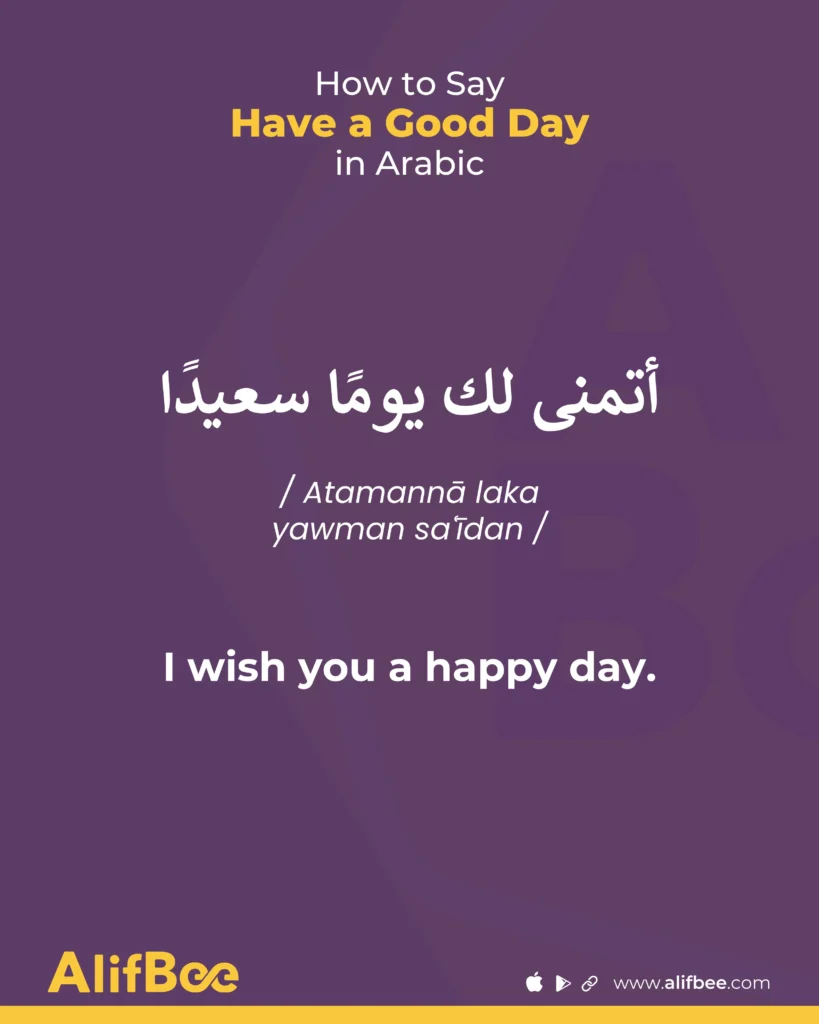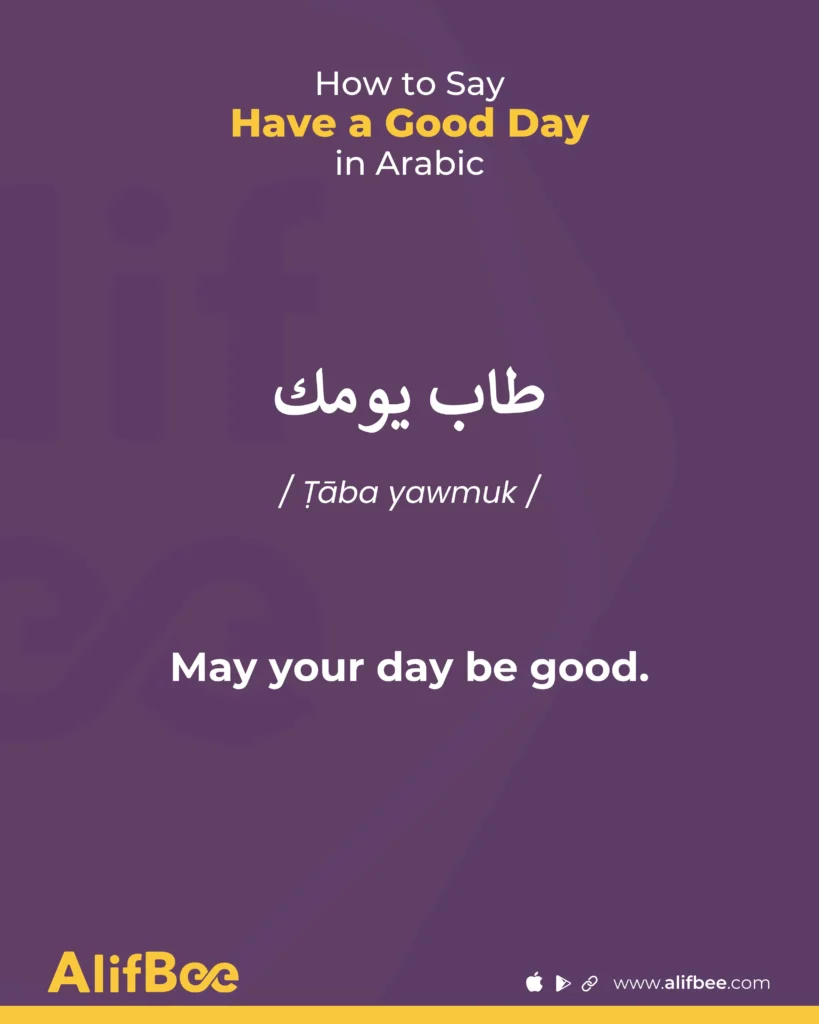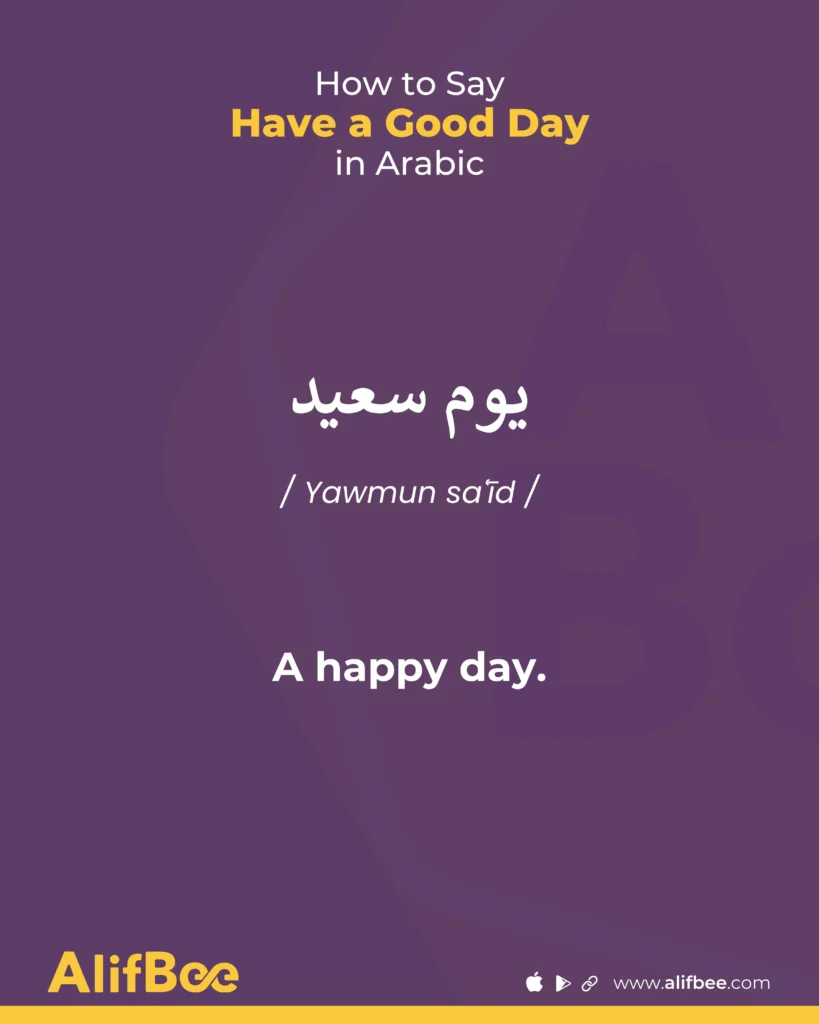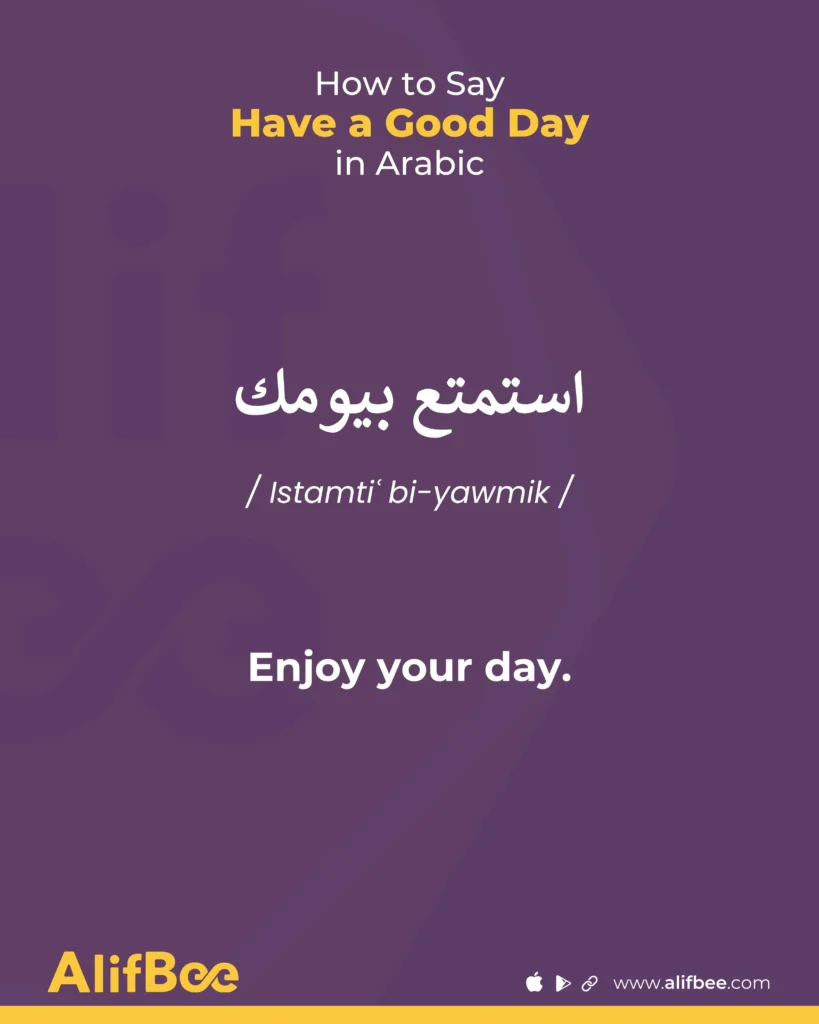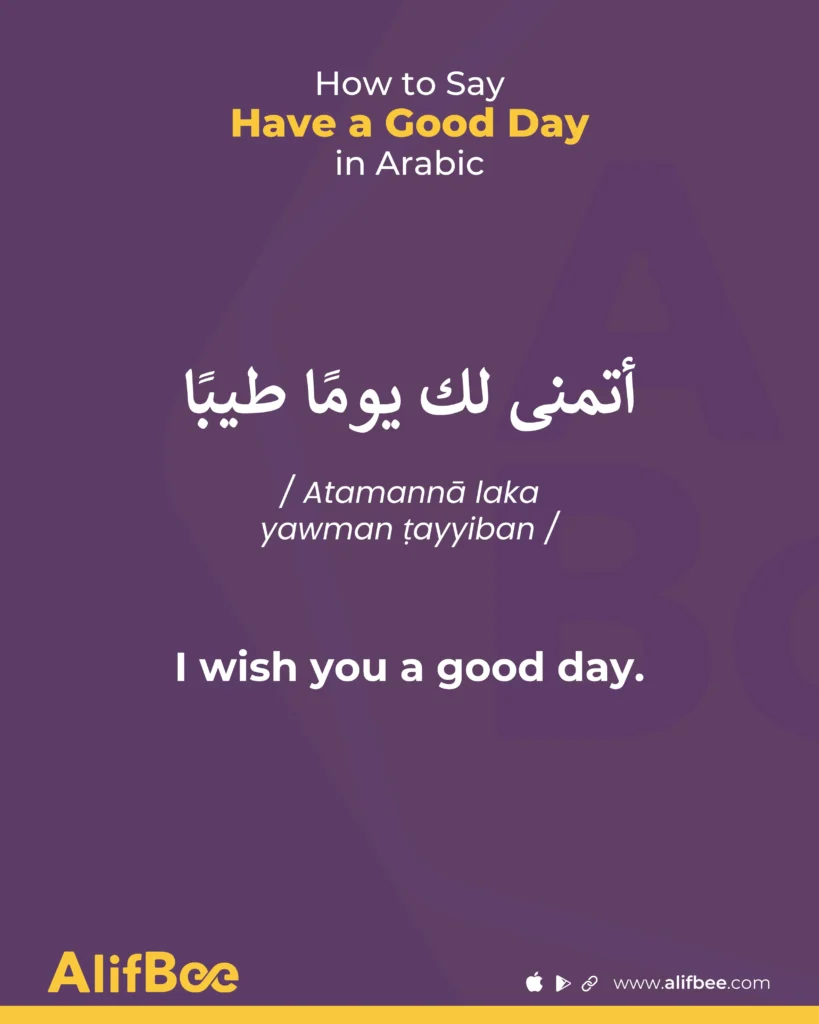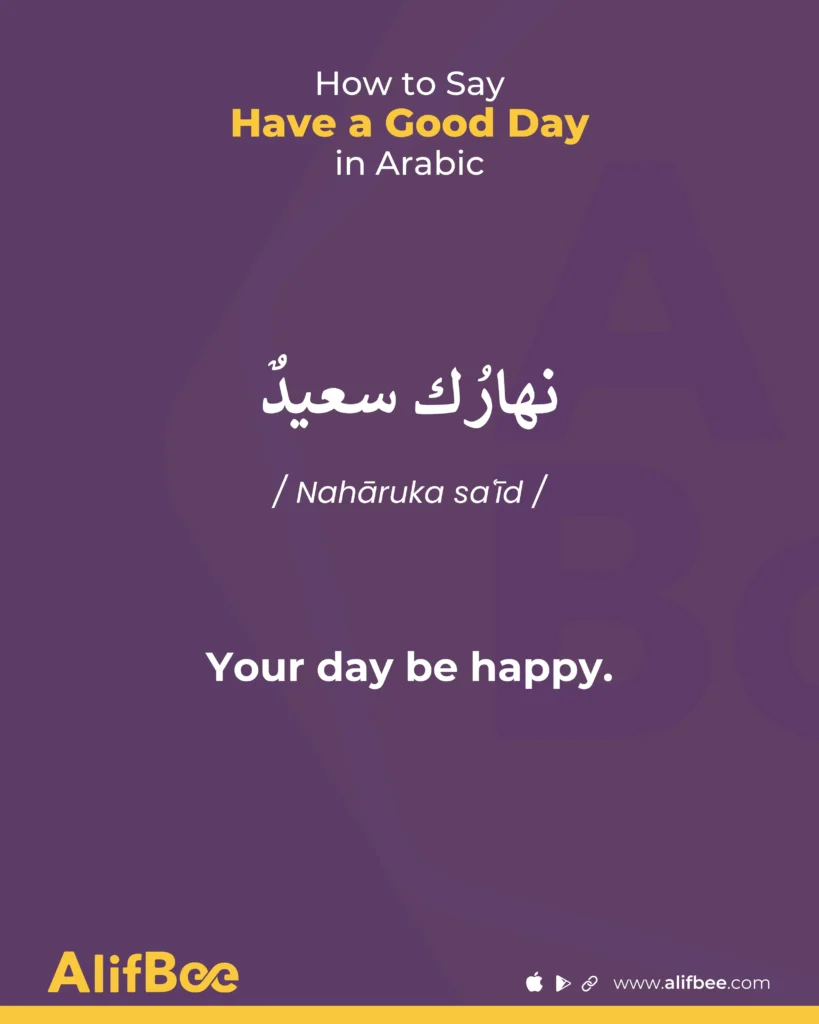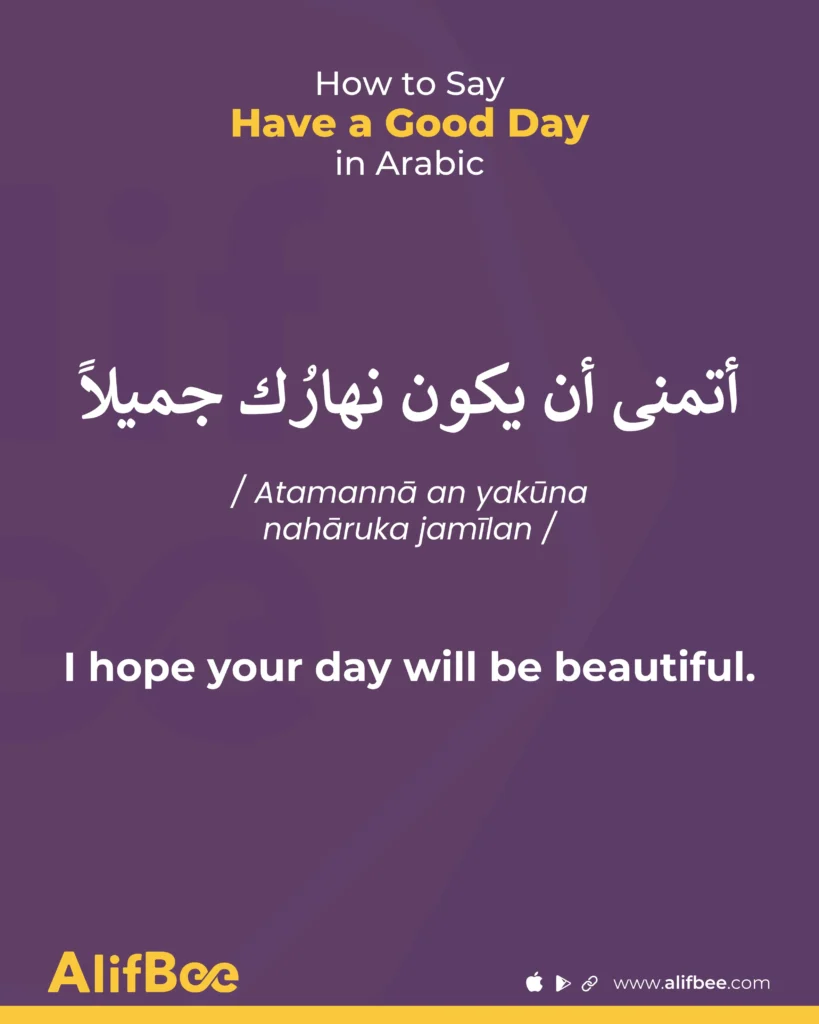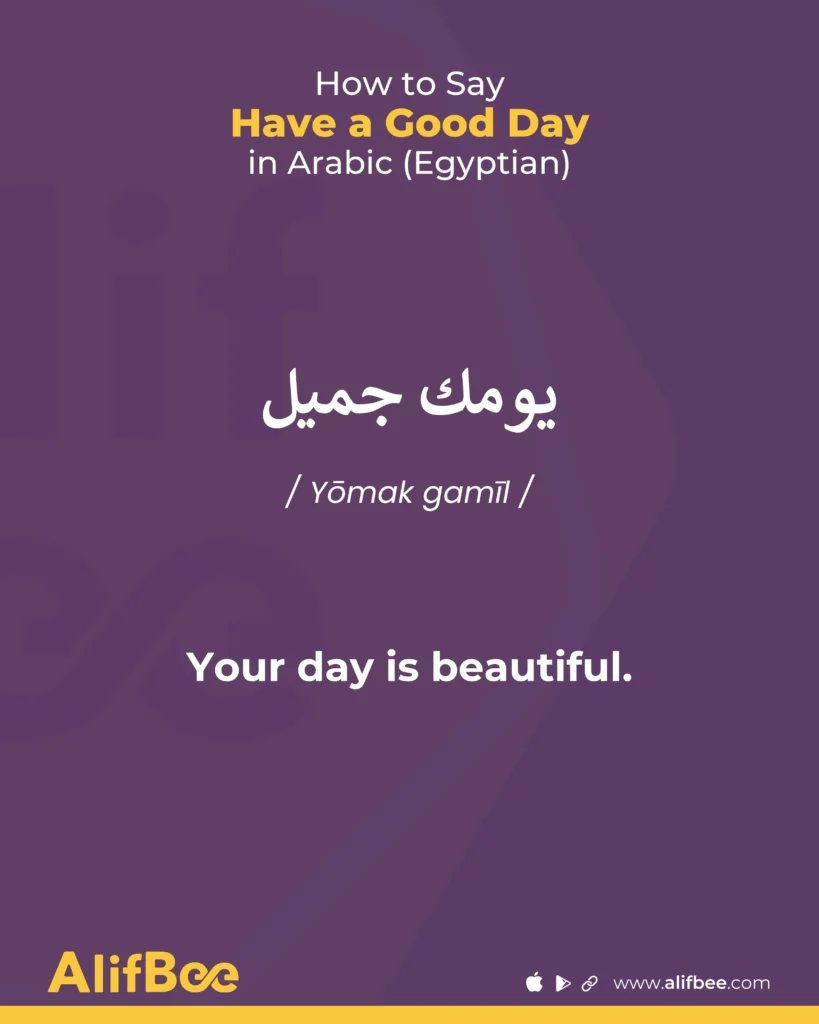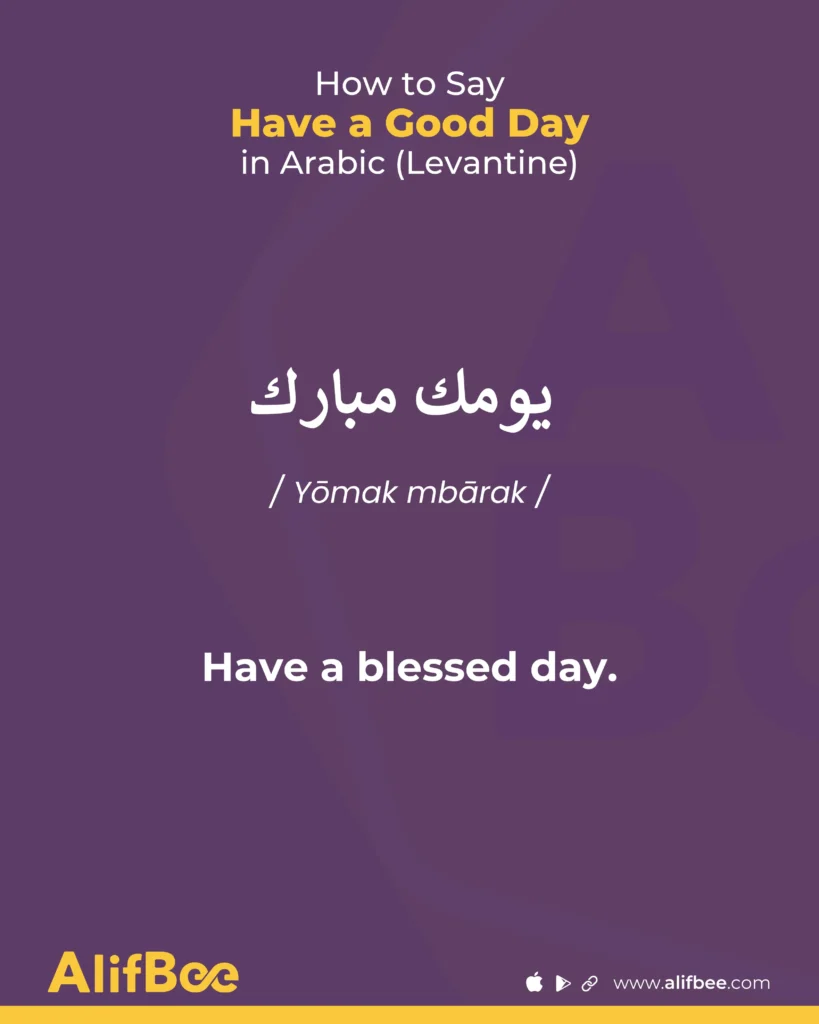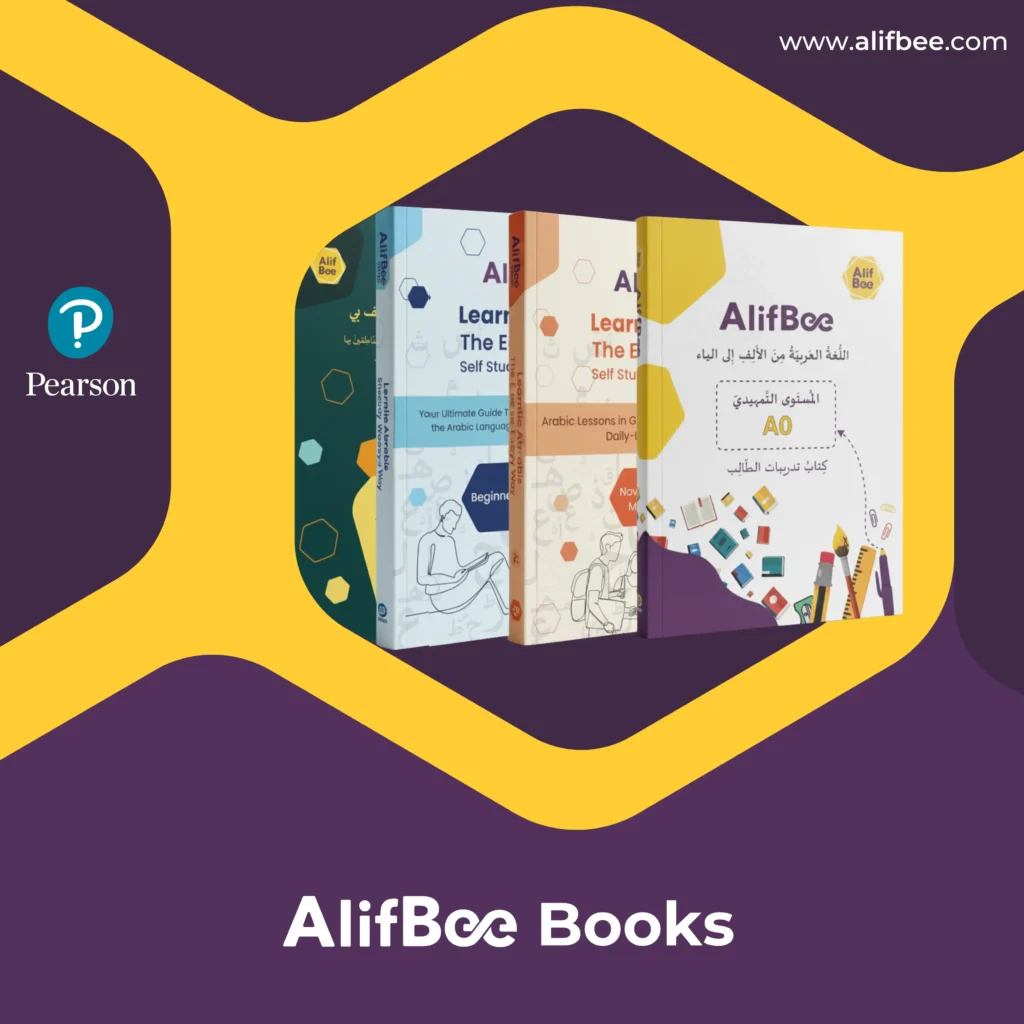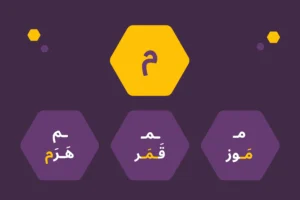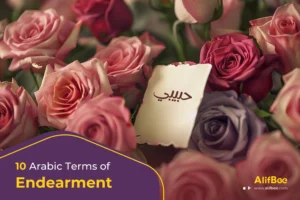Arabic greetings are more than just hellos and goodbyes; they carry genuine care that reflects the culture’s warmth and hospitality.
Sharing good wishes when parting with people is a friendly greeting that is found in all languages, especially in Arabic. It might seem like a small gesture when you hear it, but it always makes people smile and feel good.
In this article, I’ll share 10 ways to say Have a Good Day in Arabic both in Modern Standard Arabic and in colloquial dialects that are very easy for beginners.
We will also explore how each expression is said, what it means, and when to use it to wish others a great day in Arabic.
MSA vs. Dialect: What’s the difference?
Having background knowledge of the difference between MSA (Modern Standard Arabic) and dialects is helpful before learning new Arabic phrases.
MSA is the “formal” or “standard” Arabic taught in schools, used in literature, in news, and in speeches and formal settings. While MSA expressions are understood by all Arabic speakers, regardless of country of origin, dialectal Arabic refers to everyday spoken forms of Arabic (Egyptian, Levantine, Gulf, etc) that have some variations that make them difficult to uderstand even among Arabic native speakers from other regions.
If you want to wish someone a good day in Arabic, the MSA phrases work for all contexts, and are appropriate in work/email contexts, while dialectal phrases can be used with friends, in casual conversations, or among region-specific dialects.
Your Arabic Takeaway
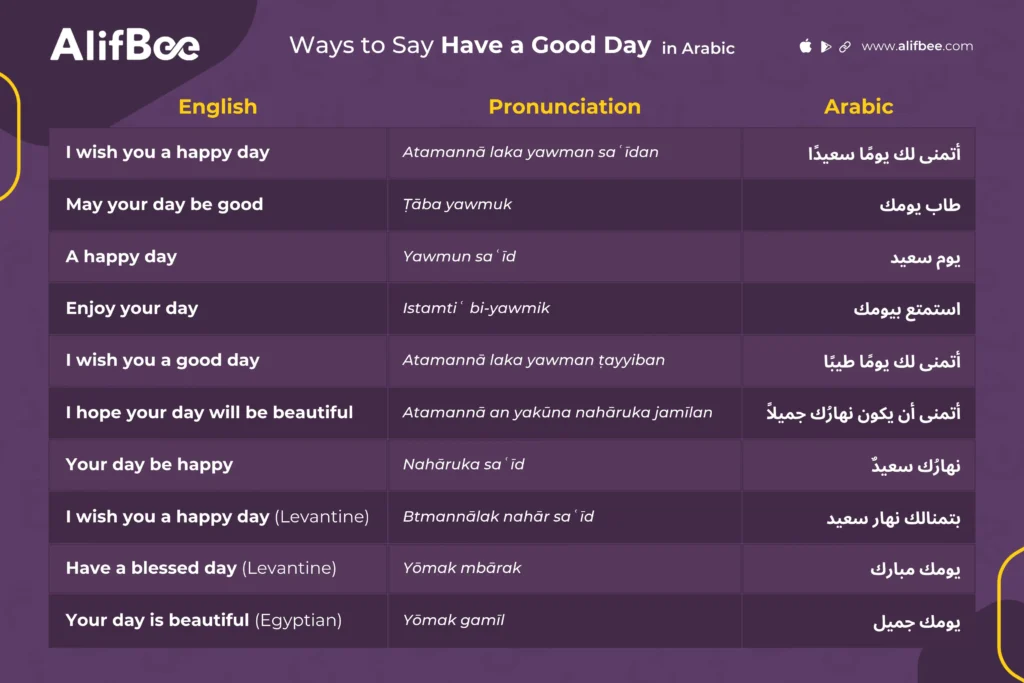
Top Arabic Phrases for “Have a Good Day” in MSA
Let’s look now at some of the most common tongue twisters in Arabic:
أتمنى لك يومًا سعيدًا — Atamannā laka yawman saʿīdan
Literal Meaning
Pronunciation
Arabic Phrase
I wish you a happy day
Atamannā laka yawman saʿīdan
أتمنى لك يومًا سعيدًا
This is one of the warmest ways to wish someone well in Arabic. It literally means “I wish for you a happy day.” The phrase comes from the verb أتمنى (atamannā) — I wish or I hope — a word that carries sincerity and care. When you say لك (laka), you’re saying “for you” — addressing someone directly with kindness. You can also use لكِ (laki) when speaking to a female.
Then comes يومًا سعيدًا (yawman saʿīdan) — a happy day — two words that fit together like a small melody.
You can use it in messages, greetings, or whenever you want to add a gentle touch to your words.
طاب يومك — Ṭāba yawmuk
Literal Meaning
Pronunciation
Arabic Phrase
May your day be good
Ṭāba yawmuk
طاب يومك
This is an Arabic greeting that is a graceful, old-fashioned way to say “Good day!” in Arabic.
The word طاب (ṭāba) comes from the verb meaning to be good, pleasant, or pure, and يومك (yawmuk) means your day. Put together, it is a wish for someone’s day to be filled with ease and goodness.
Though it’s more formal or poetic than everyday speech, you might still hear it in written Arabic, greetings, or even songs and literature.
يوم سعيد — Yawmun saʿīd
Literal Meaning
Pronunciation
Arabic Phrase
A happy day
Yawmun saʿīd
يوم سعيد
This phrase is a short, cheerful phrase that feels timeless in Arabic. It’s often used as a simple greeting or reply, much like saying “Good day!” in English.
You might hear it when someone wishes you well at the start of the day or as a polite goodbye.
استمتع بيومك — Istamtiʿ bi-yawmik
Literal Meaning
Pronunciation
Arabic Phrase
Enjoy your day
Istamtiʿ bi-yawmik
استمتع بيومك
This phrase is a friendly, modern way to wish someone well. The word استمتع (istamtiʿ) comes from the verb to enjoy, and بيومك (bi-yawmik) means with your day or in your day.
It’s the kind of phrase you’d use with friends, colleagues, or anyone you care about, whether in conversation, a text, or a casual email.
أتمنى لك يومًا طيبًا — Atamannā laka yawman ṭayyiban
Literal Meaning
Pronunciation
Arabic Phrase
I wish you a good day
Atamannā laka yawman ṭayyiban
أتمنى لك يومًا طيبًا
This sentence means “I wish you a pleasant day” in Arabic. The phrase feels gentle and kind, perfect for both formal and friendly settings. The word طيب (ṭayyib) means good, pleasant, or even pure, giving the wish a sense of warmth and sincerity. It’s a lovely alternative to أتمنى لك يومًا سعيدًا, slightly softer in tone and full of everyday kindness.
أتمنى أن يكون نهارك جميلاً — Atamannā an yakūna nahāruka jamīlan
Literal Meaning
Pronunciation
Arabic Phrase
I hope your day will be beautiful
Atamannā an yakūna nahāruka jamīlan
أتمنى أن يكون نهارُك جميلاً
This is a heartfelt and expressive phrase that feels both warm and poetic. The word نهارك (nahāruka) means your day, and جميلاً (jamīlan) means beautiful.
You might use it in a message to a friend, a loved one, or even at the end of a conversation to leave someone with a smile.
نهارك سعيد — Nahāruka saʿīd
Literal Meaning
Pronunciation
Arabic Phrase
Your day be happy
Nahāruka saʿīd
نهارُك سعيدٌ
This is a classic and friendly Arabic greeting. It’s often used the same way you’d say “Good day” or “Have a nice day” in English. The word نهارك (nahāruka) means your day, and سعيد (saʿīd) means happy.
You can use it in formal settings, workplaces, or polite conversations, especially in Egypt, the Levant and Gulf regions.
Have a Good Day in Arabic Dialects
بتمنالك نهار سعيد — btmannālak nahār saʿīd (Levantine)
Literal Meaning
Pronunciation
Arabic Phrase
I wish you a happy day (Levantine)
btmannālak nahār saʿīd
بتمنالك نهار سعيد
This is the Levantine (spoken) Arabic version of أتمنى لك نهارًا سعيدًا. It’s warm, friendly, and much more common in daily conversations than the formal version.
You can use it when greeting someone in the morning or wishing them well during the day. The word بتمنالك (btmannālak) literally means I wish for you, combining the verb to wish (بتمنى) with the pronoun لك (for you). Use the ending -lek (btmannālek) when talking to a female.
يومك مبارك — yōmak mbārak (Levantine)
Literal Meaning
Pronunciation
Arabic Phrase
Have a blessed day
yōmak mbārak
يومك مبارك
This is another common phrase used in Levantine Arabic in the form of a friendly greeting upon meeting people early in the morning. It is commonly heard in markets or souks, as people start their day and salute each other.
They also say يومك مبارك بالصلاة على النبي, yōmak mbārak bi-al-ṣalāh ʻalá al-Nabī which means “May your day be blessed with the Salah made to the Prophet”. It invokes the blessings from saying “May peace be upon the Prophet Muhammad”. And being such a warm Islamic supplication, this expression is not exclusive to the Levantine dialect; it can be heard in Gulf and Egyptian dialects too.
طاب يومك — Ṭāba yawmuk
Literal Meaning
Pronunciation
Arabic Phrase
Your day is beautiful (Egyptian)
yōmak gamīl
يومك جميل
This is a warm, cheerful phrase in Egyptian Arabic that means “Your day is beautiful.” Egyptians often use it in casual conversation to wish someone a pleasant day or to respond to a kind greeting.
The word يومك (yōmak) means your day, and جميل (gamīl) means beautiful — together, they sound simple yet full of warmth. You might hear someone say it in the morning at work, to a friend, or even as a kind sign-off in a message. Like much of Egyptian Arabic, it feels effortless, friendly, and full of charm.
Usage Tips & Common Mistakes
- Don’t over-use very formal MSA phrases in casual everyday chats — a super-formal phrase may feel stiff or unnatural among friends.
- Be careful with gender variant: Arabic is a gendered language, so “you (masc)” and “you (fem)” differ. For example “لكَ” (laka) vs “لكِ” (laki).
- Avoid mixing MSA and slang awkwardly: e.g., using a formal phrase but in a super-casual setting may feel odd; using a slang phrase in a formal business email may also mis-fit tone.
- Understand dialectal context: For instance, saying “بون جورن” (bon journ) outside Lebanon may confuse non-Lebanese speakers.
- Literal translations don’t always carry the same nuance: One Redditor writes: “The most close expression to “have a nice day” is: (youm sa’eed) يوم سعيد; lit. Happy day. But that’s not a so common thing to say.” So, knowing common usage matters.”
- Plurals: If you’re wishing a group of people, adjust to plural masculine/feminine forms. E.g., “لكم” (lakum) for “you all”.
Quick Quiz
You’re leaving work at noon and saying to your colleague, “Have a good day!”
a) بون جورن (bon journ)
b) أتمنى لك يومًا سعيدًا (Atamannā laka yawman saʿīdan)
c) بتمنالك نهار سعيد (btmannālak nahār saʿīd)
You finish a formal email to your manager and want to close politely with “Have a good day in Arabic”
a) يومك جميل (yōmak gamīl)
b) أتمنى لك يومًا سعيدًا (Atamannā laka yawman saʿīdan)
c) نهارك سعيد (Nahāruka saʿīd)
You’re texting a friend in Egypt. You want to say “Enjoy your day!”
a) استمتع بيومك (Istamtiʿ bi-yawmik)
b) يومك جميل (yōmak gamīl)
c) طاب يومك (Ṭāba yawmuk)
You’re in Syria, greeting someone in the morning, and you want to wish them a good day in a local way.
a) طاب يومك (Ṭāba yawmuk)
b) طاب يومك (Ṭāba yawmuk)
c) بتمنالك نهار سعيد (btmannālak nahār saʿīd)
- C
- B
- B
- C
Final word
There are many valid ways to say “have a good day in Arabic”, and your choice depends on context (formal vs informal), dialect (MSA vs regional), gender/plurality, and your tone.
Here’s your tip from AlifBee: Pick two or three of the phrases above, practice them, and listen out for them in native usage. Over time you’ll start to feel which phrase fits the situation.
Anyway, that’s it from us and to end it the right way: أتمنى لك يومًا سعيدًا! (Have a good day!)

